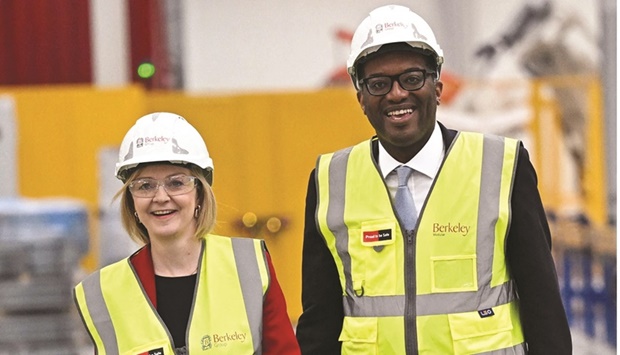Britain’s new Finance Minister Kwasi Kwarteng yesterday unleashed historic tax cuts and huge increases in borrowing in an economic agenda that floored financial markets, with sterling and British government bonds in freefall.
Kwarteng scrapped the country’s top rate of income tax, cancelled a planned rise in corporate taxes and for the first time put a price tag on the spending plans of Prime Minister Liz Truss, who wants to double Britain’s rate of economic growth.
Investors unloaded short-dated British government bonds as fast as they could, with the cost of borrowing over five years seeing its biggest one-day rise since 1991, as Britain raised its debt issuance plans for the current financial year by £72.4bn to £234.1bn ($259bn). The pound slid below $1.11 for the first time in 37 years.
Kwarteng’s announcement marked a step change in British economic policy, harking back to the Thatcherite and Reaganomics doctrines of the 1980s that critics have derided as a return to “trickle down” theory.
Truss, elected as prime minister earlier this month by a vote of the Conservative Party’s 170,000 members, has vowed to cut regulations and pursue overall economic growth even if it favours the wealthy at a time when millions are struggling to cover basic household bills.
“That is how we will compete successfully with dynamic economies around the world,” Kwarteng said. “That is how we will turn the vicious cycle of stagnation into a virtuous cycle of growth.”
The so-called mini budget is designed to snap the economy out of a period of double-digit inflation driven by surging energy prices and a 15-year run of stagnant real wage growth.
Moves to subsidise energy bills will cost £60bn just for the next six months, Kwarteng said — part of a promise to support households for two years.
Tax cuts - including an immediate reduction in a property purchase tax - would cost a further £45bn by 2026-27, he said, costs that could be recovered by a rise in annual economic growth of 1 percentage point over five years — a feat most economists think unlikely.
Britain also will accelerate moves to bolster the City of London’s competitiveness as a global financial centre by scrapping the cap on banker bonuses ahead of an “ambitious deregulatory” package later in the year.
“In 25 years of analysing budgets this must be the most dramatic, risky and unfounded mini-budget,” said Caroline Le Jeune, head of tax at accountants Blick Rothenberg.
“Truss and her new government are taking a huge gamble.”
Financial markets ramped up their expectations for British interest rates to hit a peak of more than 5% midway through next year.
The market backdrop could barely be more hostile for Kwarteng, with the pound performing worse against the dollar than almost any other major currency.
Much of the decline reflects the US Federal Reserve’s rapid interest rate rises to tame inflation — which have sent markets into a tailspin — but some investors have taken fright at Truss’s willingness to borrow big to fund growth.
A Reuters poll this week showed 55% of the international banks and economic consultancies that were polled judged British assets were at a high risk of a sharp loss of confidence.
The opposition Labour Party said the plans were a “desperate gamble” by a government running out of ideas after 12 years in power.
“Lower growth, lower investment, lower productivity. And today, we learn we have the lowest consumer confidence since records began. The only things that are going up are inflation, interest rates and bankers’ bonuses,” said Labour’s finance spokeswoman Rachel Reeves.
The Institute for Fiscal Studies said the tax cuts were the largest since the budget of 1972 — which is widely remembered as ending in disaster because of its inflationary effect.
On Thursday the Bank of England said Truss’s energy price cap would limit inflation in the short term but that government stimulus was likely to boost inflation pressures further out, at a time when it is battling inflation near a 40-year high.
“We are likely to see a policy tug of war reminiscent of the stop-go 1970s. Investors should be prepared for a bumpy ride,” said Trevor Greetham, head of multi-asset at Royal London Asset Management.
Despite the extensive tax and spending measures, the government did not publish new growth and borrowing forecasts from the Office for Budget Responsibility (OBR), a government watchdog.
The National Institute of Economic and Social Research (NIESR) said the budget deficit looked set to rise to 8% of gross domestic product during the current financial year.

Britain’s Prime Minister Liz Truss and Britain’s Chancellor of the Exchequer Kwasi Kwarteng chat during a visit to Berkeley Modular, in Northfleet, in southeast England yesterday.
